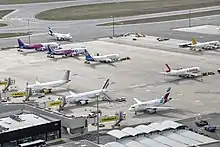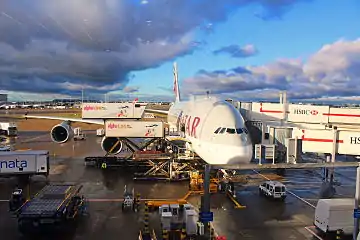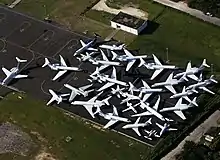Airport apron
The airport apron, flight line, or ramp is the area of an airport where aircraft are parked, unloaded or loaded, refilled, or boarded.[1] Although the use of the apron is covered by regulations, such as lighting on vehicles, it is typically more accessible to users than the runway or taxiway. However, the apron is not usually open to the general public and a permit may be required to gain access. By extension, the term apron is also used to identify the air traffic control position responsible for coordinating movement on this surface at busier airports.



The use of the apron may be controlled by the apron management service (apron control or apron advisory) to provide coordination between the users.
The apron is designated by the ICAO as not being part of the maneuvering area. All vehicles, aircraft and people using the apron are referred to as apron traffic.
Other terms
Flight line
The US military typically refers to the apron area as the flight line.
Tarmac
Some in the general public and news media refer to the apron at airports as the tarmac even though most of these areas are paved with concrete, not tarmac.[2] Specific materials used include asphalt concrete (which itself is often inexactly called "tarmac," adding to the confusion), porous friction course, and Portland cement concrete.[3]
Ramp
In the United States, the word ramp is an older term for an area where pre-flight activities were done; an apron was any area for parking and maintenance. Passenger gates are the main feature of a terminal ramp. The word apron is the ICAO and FAA terminology (the word ramp is not), so the word ramp is not used with this meaning outside the US, Canada, Maldives, and the Philippines.
See also
| Wikimedia Commons has media related to Airport aprons. |
References
- FAA Advisory Circular 120-57A – See page 2 for definition of Apron (Ramp)
- https://aerosavvy.com/aviation-terminology/
- https://www.faa.gov/airports/northwest_mountain/engineering/construction_resources/media/pavement-manual.pdf
External links
 Media related to Airport aprons at Wikimedia Commons
Media related to Airport aprons at Wikimedia Commons- Challenges to airport ramp and runway debris control